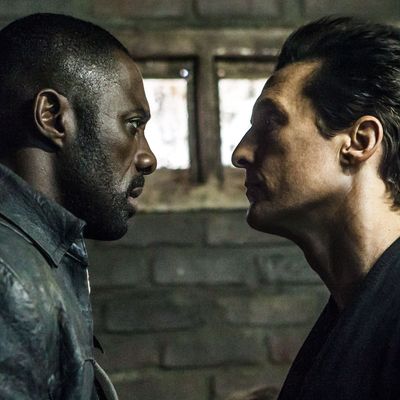
There are many good things about the fantasy epic The Dark Tower, based on 37 novels by Stephen King, all of which I have read. Largely they relate to what the movie is not. It is not three hours. It is not saddled with five climaxes. It is not likely to generate tiresome sequels, prequels, or spinoffs, though I doubt that was its makers’ intention. Most important, it is not that terrible. Its derisive reception can be attributed, as much as anything, to timing. The Dark Tower has the bad fortune to seem like the distillation of everything derivative and dull-witted in the sci-fi–fantasy genre that has a stranglehold on our current pop culture. So it’s a handy target. Even fanboys want to lock it in the Wicker Man and throw torches.
Although, as I said, I’ve read all 46 Dark Tower novels, I’m not really a King fan. The problem is, I’ve seen all the same movies he has, so I generally know where he’s going. That he’s open about his influences makes me like him more but respect him less. The first Dark Tower book was the work of a young writer who thought it would be neat idea to take Clint Eastwood’s gunslinger and Lee Van Cleef’s murderous Man in Black from The Good, the Bad, and the Ugly and set them down in The Lord of the Rings, where the looming central tower is now a force for Good that keeps All Bad Things at bay. King then threw in his signature character, his archetype, his avatar: the Boy with the Shine. “His shine is pure,” purrs the movie’s Man in Black. “His shine is beyond anything I’ve ever seen,” says the psychic Arra of his aura, not in error.
The boy, Jake Chambers, is at the center of Nikolaj Arcel’s movie, which is not based on any one Dark Tower novel but is a cut-and-paste job of elements from several. If you haven’t read all 62, as I have, you might have a hard time following the various portal jumps. I shall orient you. On the opposite portal-side from Manhattan, entities in human skin needing frequent replacement suck psychic protoplasm from children writhing in dentist chairs and blast it from a giant cannon at the tower, which takes the hits but pointedly refuses to crumble. The Man in Black — Matthew McConaughey, wearing black — is on the lookout for a child whose brain has more advanced tower-crumbling abilities.
His stepfather, blaming Jake’s drawings of the Gunslinger, the Man in Black, and children bolted to dentist chairs on the influence of Stephen King, does not believe Manhattan is in danger. So Jake must fight off a banister and floorboards and get through the portal. The Gunslinger (Idris Elba), on the verge of shooting the boy as a spy, relents when he sees how fine he looks in Jake’s drawings and sets about raising money for art school. His Jedi-like credo, which he periodically recites, seems a bit off these days: “I do not kill with my gun; he who kills with his gun has forgotten the face of his father. I kill with my heart.” That was conceived back in 1980, when the Jedi didn’t appear to admit women. Now they might have something to say about the over-veneration of the patriarchy. Wonder Women might also want a word.
I have a soft spot for the movie’s much-maligned special effects, which are choppy and not especially convincing but don’t, at least, have the assembly-line quality of bigger-budget fantasy epics. A touch of Bedknobs and Broomsticks isn’t a bad thing, if you ask me. But the crude computer work is The Dark Tower’s only surprise. Although the platoon of screenwriters succeeds in squeezing those 134 novels into a mere 95 minutes, the movie feels like a copy of a copy of a copy. The thing about King is that his passion is always palpable, even when his material is second- or third-hand, whereas no one here seems to be having any fun. The movie is wan and perfunctory. The loss of the Gunslinger’s dad takes about 23 seconds, most of them of Dennis Haysbert speaking very slowly, so the pain of his absence doesn’t linger. And while the boy is not, as fantasy juveniles go, an irritant, keeping oneself from being strapped into a dentist chair so one’s brain-ball can be shot out of a cannon at an inanimate object doesn’t have the puissance of, say, zapping Voldemort or using the Force to torpedo the Death Star. In Joseph Campbell’s The Hero With a Thousand Faces, this would be one of the lesser faces.
Elba’s face, meanwhile, is largely impassive — perhaps in homage to Eastwood, who didn’t have much choice at the time. (Eastwood developed his acting chops later.) It’s a mistake. He’s a hundred times the actor Eastwood is but will never have the same iconic scowl. He was built to emote.
The Dark Tower belongs to McConaughey, who drops his voice a notch and lessens the impact of his Texas drawl by hitting the ends of words hard, like a seasoned Brit. Otherwise, his triumph is based on a simple idea. To convey the Man in Black’s power, he has decided to expend zero effort, which turns out to be remarkably easy for him to do. His face, reduced by diet (or something) to a pair of sharp cheekbones, looks shellacked, and his method of killing consists of saying, matter-of-factly, “Don’t breathe” —whereupon actors fall to the floor and pretend to be dead, as per the script. As a mascot, McConaughey embodies the movie’s lack of conviction, but as an indication that a star could conceivably be computer-generated with no loss of affect or facial mobility, he might inspire the next generation of bloodless fantasy epics.





